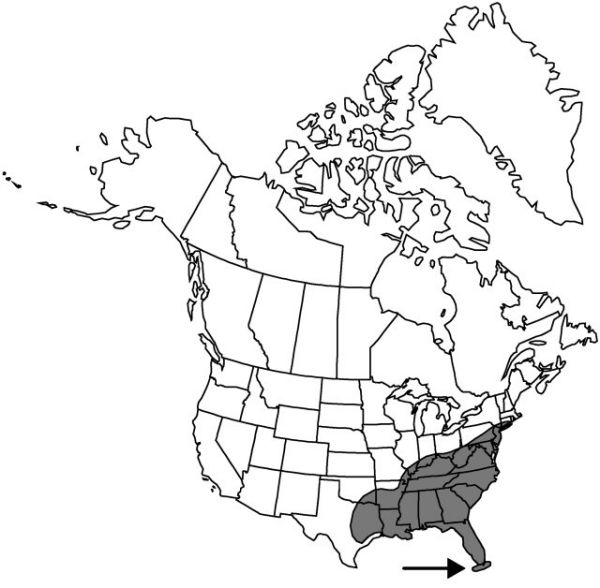Smilax glauca
Fl. Carol., 245. 1788.
Vines; rhizomes tuberous, or spinose, linear. Stems perennial, climbing, branching, green, often mottled, terete, to 5+ m, woody, glaucous, glabrous; prickles, when present, thin, 1–5 mm. Leaves deciduous to semi evergreen, ± evenly disposed; petiole 0.5–1.5 cm; blade green to glaucous-green, often mottled adaxially, silvery grayish abaxially, drying to brownish tan adaxially, broadly ovate, elliptic to reniform, with 3 (or 5) conspicuous veins, 4.5–11 × 2.5–6.6 cm, glabrous and glaucous abaxially, base truncate, subcordate, or attenuate, margins entire, apex rounded, tapering, or short-acuminate. Umbels few-to-many, axillary to leaves, 5–12+-flowered, open, umbellate to hemispherical; peduncle 2–5 cm. Flowers: perianth yellow to bronze; tepals 3–7 mm; anthers longer than filaments; ovule 1 per locule; pedicel 0.5–1 cm. Berries blue to black, subglobose, 8–10 mm, shiny black at maturity, glaucous. 2n = 28, 32.
Phenology: Flowering May–Jul.
Habitat: Dry to wet woods, thickets, hedge- rows, roadsides
Elevation: 0–800 m
Distribution

Ala., Ark., Conn., Del., D.C., Fla., Ga., Ill., Ind., Ky., La., Md., Miss., Mo., N.J., N.Y., N.C., Ohio, Okla., Pa., S.C., Tenn., Tex., Va., W.Va.
Discussion
Smilax glauca is easily recognized by its glaucous to whitened abaxial leaf surfaces, which, however, may be altered by heat in drying. It is reportedly the most weedy species of the genus. The plants tend to be evergreen in the more southern part of the distribution.
Selected References
None.
Lower Taxa
"thin" is not a number.